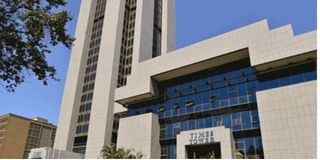Premium
KRA lines up new Sh1.7bn one-stop taxpayer system

Times Tower, Kenya Revenue Authority headquarters in Nairobi.
The Kenya Revenue Authority (KRA) is set to introduce a new unified taxpayer system, which is likely to serve as a one-stop shop for filing all returns at an estimated cost of Sh1.73 billion.
The KRA estimated that setting up the system would consume about 17 per cent of its projected spending of Sh10.26 billion in the financial year 2023/24, according to disclosures by the tax agency.
The taxman says the sum includes the cost of acquiring the software for the unified tax system, designing the platform, setting up a new tax platform (NextGen), a new customs platform, an intelligent risk management system, and a comprehensive e-invoicing system.
The new system will also offer enhanced data analytics, a centralised production monitoring system, an API management platform, and a unified customer self-service system.
KRA’s iTax system, which is used for filing various taxes is bogged down by frequent technical defects, especially whenever there are changes in tax rates.
Yesterday, for instance, the KRA revealed it has resolved multiple defects on iTax, which have been affecting the filing of new taxes following the passage of the Finance Act 2023.
For instance, several employers who filed their pay-as-you-earn (PAYE) returns, including the new housing levy were unable to generate a payment slip for the July 2023 housing levy liability. “The issue has been resolved and affected taxpayers should generate PRNs and proceed to effect payment,” said the taxman.
The KRA has been operating multiple tax platforms, including an electronic tax invoice management system (eTIMS) for payment of value-added tax (VAT) by registered companies.
Through eTIMS, taxpayers generate electronic tax invoices that are transmitted to KRA in real-time, and VAT-registered taxpayers are now required to only accept electronic tax invoices.
The KRA expects to increase VAT collection to Sh521.5 billion in June 2027.
In October 2021, the tax agency ceased clearing customs goods on its old manual Simba system except for petroleum products and completely knocked down motorcycle kits.
Also Read: KRA gets new boss
The taxman has shifted to the Integrated Customs Management System (iCMS), which has eased customs management by eliminating redundant processes thus cutting the time and cost of doing business.
In the iCMS, traders are required to submit sea manifests for both imports and exports 48 hours before a vessel arrives or departs.
The KRA is at the centre of President William Ruto’s plan to wean the country off the debt by increasingly internally generating revenues by widening the tax net.





